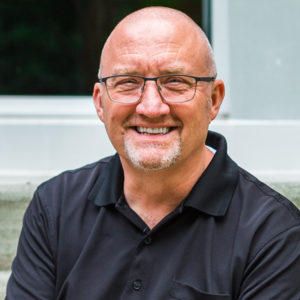
Bishop Matt Whitehead
Bishop Matt Whitehead, D.Min., oversees Free Methodist ministries in the Western United States and also in Africa. He was elected the lead bishop of the Free Methodist Church – USA at General Conference 2019. He previously served more than 20 years as the superintendent of the Pacific Northwest Conference after 17 years as a local church pastor.
by Bishop Matt Whitehead
I was a sprinter. Our local paper in Redford, Michigan, referred to me as “the clumsy sprinter.” Needless to say, I didn’t have that moniker embroidered on my high school letterman’s jacket. However, it was a fairly accurate description of my unorthodox running style.
Relays were my favorite event. I was often the anchor (last runner) and felt the pressure of winning was on me. The performance of the first three runners was critical, but there was a sense of overwhelming responsibility as the last runner.
The short distance relays can be won, or lost, in the exchange of the baton. We’d practice that exchange over and over, day after day. The coach’s advice was always the same, “Don’t drop the baton!”
The theme of this month’s LIGHT + LIFE is “Bridging Generations.” I like what Free Methodist Church – USA Communications Director Brett Heintzman wrote about this, “Our generational differences do not diminish our need for one another. We need exchange of generational ideas, dreams, vision and wisdom. Young and old belong at the table where discipleship is lived-out and iron sharpens iron” (fmcusa.org/light-life/llmag2020).
Passing along the generational baton of faith isn’t something we are called to do in the future. It’s a present tense component of a vital faith journey. The Apostle Paul lived this out in his relationship with Timothy. Look at these words of instruction from a godly mentor to his younger son in the faith:
“I am reminded of your sincere faith, which first lived in your grandmother Lois and in your mother Eunice and, I am persuaded, now lives in you also” (2 Timothy 1:5).
“And the things you have heard me say in the presence of many witnesses entrust to reliable people who will also be qualified to teach others” (2 Timothy 2:2).
Paul’s instruction to Timothy is so important for us to understand and emulate. Take note of these basic principles of “Bridging Generations”:
Remember Your Story
God has no grandchildren, but Timothy had an amazing family spiritual history. His grandmother, Lois, and mother, Eunice, were devout Christ-followers. Paul reminds Timothy of the impact these godly women had on his life and then takes it a step further by exhorting Timothy because Paul sees that same sincere faith in him. Those must have been humbling, impactful words for Timothy.
Some of us have the advantage of being raised in Christian homes. Some of us are first-generation Christians. Both journeys are reminders of God’s grace, and both journeys have unique challenges. No matter how we’ve come to know, love and serve Jesus, we need to remember our story and take note of those who’ve invested in us. As you read these words, take a moment and give God praise because you are the benefactor of those who have invested in and loved you to Jesus.
Keep the Path Clear
I love this phrase from my friend Ed McDowell, the executive director of Warm Beach Camp. We are called to “keep the path clear to the cross.” We should live our lives in such a way that our single focus is pointing people to Jesus in any and every way we can.
At this time, we are being called to listen, hear and respond as never before. For some of us, the thought that racism still exists in our society is hard to believe. We’ve naively assumed that racism was in our past. That is not the case. Others of us have experienced racism, and this season seems like another sad chapter in a long story where nothing ever changes.
When we deny that racism exists in our society and in the church or attempt to defend actions that are indefensible, we become stumbling blocks, and our witness for Jesus is tarnished. Our posture of believing what our brothers and sisters of color are telling us, listening to their perspective, and seeking to be agents for reconciliation is one tangible way that, right now, we can “keep the path clear to the cross.”
Get Over Yourself
At the funeral of President George H.W. Bush, former Sen. Alan Simpson said Bush “was a man of great humility. Those who travel the high road of humility in Washington, D.C., are not bothered by heavy traffic.”
I once had a co-worker who said to me on several occasions, with a smile on his face, “Get over yourself.” It was a truth I needed to hear. I was overthinking a challenging situation and had made it about me and my feelings. The ability not to take ourselves too seriously is a gift we give those who are watching our lives and seeking to emulate us.
As I think back across the span of my life, I was deeply impacted by the people who exhibited a Jesus-centered gracious humility. My parents, Les and Esther Whitehead, were devoted Christ-followers who were sold out to Jesus and His call to point people to Him. They weren’t perfect, but they exhibited this gracious humility that was so inviting.
As you think about your spiritual journey and the call to pass the baton of faith, think about these questions:
- How do you see God’s hand on your faith journey? What implications does it have for others who are learning from and watching you?
- Are you keeping the path clear to the cross? What does it mean for you to take a posture of listening and hearing from people’s experiences that are different than yours?
- Is your journey characterized by humility and the willingness to listen and learn?
May our faith journeys be lived out in such a way that our faith is passed on to those we are investing in and those we are learning from. For heaven’s sake, don’t drop the baton! +

Bishop Matt Whitehead
Bishop Matt Whitehead, D.Min., oversees Free Methodist ministries in the Western United States and also in Africa. He was elected the lead bishop of the Free Methodist Church – USA at General Conference 2019. He previously served more than 20 years as the superintendent of the Pacific Northwest Conference after 17 years as a local church pastor.









